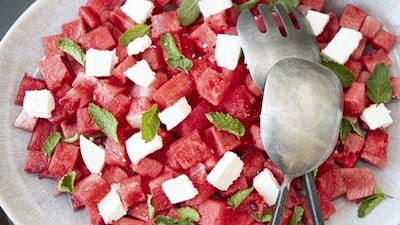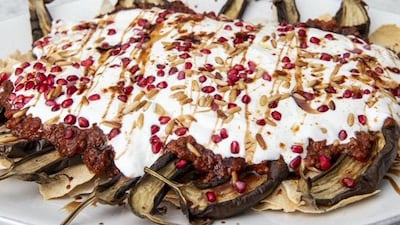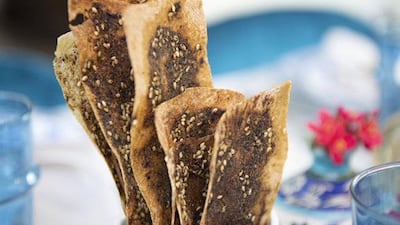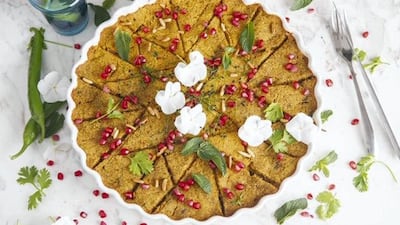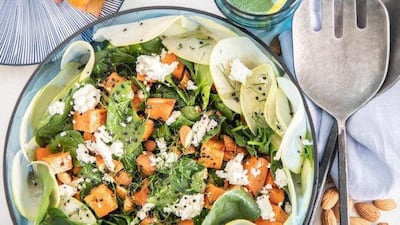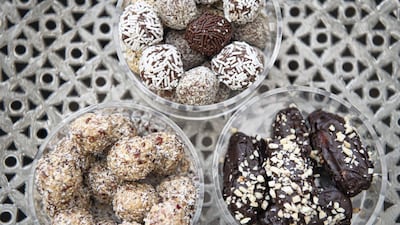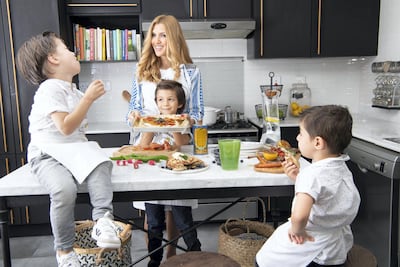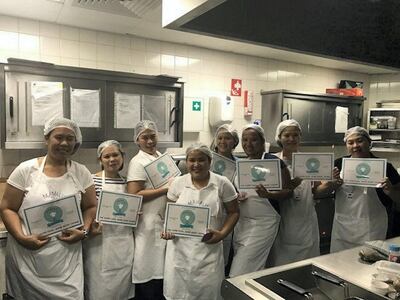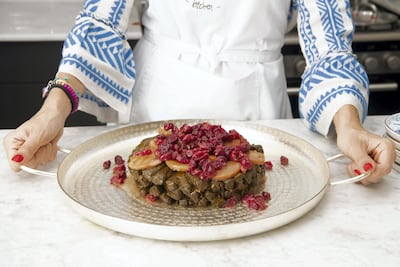Hairnets in place and aprons on, a group of about 20 women are hard at work in a cooking studio in Dubai. The atmosphere is relaxed, and laughter fills the air as they slice and chop. This is no run-of-the mill class, however, as these ladies are not learning to cook for themselves, but for their employers.
At the helm of the operation is culinary aficionado Lama Jammal, founder of Mamalu Kitchen, who spends her time animatedly floating from station to station, training nannies and helpers to make home-cooked dishes, healthy snacks and children's school lunches.
Mamalu Kitchen has always had a very clear mission: helping mothers and feeding families. The idea came to the Lebanese entrepreneur a few months after giving birth to twin boys. “It was Ramadan,” Jammal says, “I had a one-year-old son, two babies and a fasting husband, and I wished I had some help in the kitchen. That’s how Mamalu was born.
Mamalu Kitchen has always had a very clear mission: helping mothers and feeding families. The idea came to the Lebanese entrepreneur a few months after giving birth to twin boys. “It was Ramadan,” Jammal says, “I had a 1-year-old son, two babies and a fasting husband, and I wished I had some help in the kitchen. That’s how Mamalu was born.
“Many working mothers simply don’t have the time to spend on cooking. In this region, many are fortunate enough to have help, so we can delegate,” she says. But Jammal knew that the move was a potential risk. “I knew I did not want my classes to turn into some kind of butler service. I wasn’t sure what kind of response I would get.”
However, the risk paid off. Jammal has since taught hundreds of helpers, in both English and Tagalog with the aid of a translator, with some very positive results. "The best part is hearing from clients who had never sat down at a table together before, and are now eating as a family," she says, "I receive photos from nannies showing me dishes they have made. It's very rewarding."
Shamsa Baker, an Emirati mother of four, enrolled her children’s nanny, Hanzel, into classes and noticed a transformation in her home. “I love being able to teach my nanny to cook all the foods I want to make for my children, but don’t necessarily have the time, because some days I am so busy with school pick-ups and meetings,” Baker says. “And now my kids eat their vegetables without a fuss.”
Hanzel, who is from the Philippines, in turn saw this as an opportunity to learn new skills. “Mamalu courses were fun but informative, especially from a healthy, safety and food hygiene aspect.”
Another repeat client of Mamalu is Fatima Mazrui, managing director of The Change Initiative, which provides sustainable solutions for the community, business and government. The mother-of-four's nanny, Nelia, has also attended several Mamalu classes. Mazrui stresses the importance of home cooking from an environmental and economic aspect. "The classes have shown my family how to recycle and upcycle food, minimising wastage. Grocery budgets are also kept under control. Lama is the fairy godmother of home cooking."
Nelia, also from the Philippines, says she enjoyed the sense of camaraderie. “I’ve made friends. The classes were fun and it was easy to learn,” she says. “Because the recipes were [taught] in Tagalog, they were simple to make.”
Jammal, who spent her childhood shadowing her mother in the kitchen before getting her degree at Swiss hospitality management school Glion, specialises in simple, Mediterranean-inspired fare. Her signature dishes include classic Middle Eastern recipes with a twist: vegetarian pumpkin kibbeh and cranberry vine leaves.
She has amassed a significant social media following and recently launched a YouTube channel, sharing themed content, recipes, tips and tricks for newlyweds, bachelors and mothers alike. Jammal is also set to open a cooking studio in Dubai at the end of the year in Nakheel Mall on Palm Jumeirah, running classes for corporations, helpers, parents, couples and even teenagers leaving home for the first time for university. "I want to create a movement," she says, "By engaging every single member of the household, we are enabling a lifestyle change in the region."
And a change has been a long time coming. "It is estimated that about 40 per cent of children in the UAE are either overweight or obese," Dr Sherif El-Refee, a consultant paediatric endocrinologist and diabetologist at Imperial College of London Diabetes Centre, told The National last month. Home-cooked meals can play a significant role in bringing the numbers down, according to nutritionist Zeina Maktabi of Up Close and Healthy.
"Besides being able to control exactly what goes into food, home-cooked meals bring the family together," she says. "You can turn grocery shopping into a fun activity. You would be surprised at how many children don't know what an aubergine looks like. There is also the mental health aspect to sitting down together, boosting confidence and increasing bonding time."
Still, there is a long way to go. “Even with home cooking,” Maktabi says, “it isn’t always the best methods that are being used. There is a lot of deep frying. Sometimes, families may delegate meals to the house help. They may add more fat or salt than they should.
“There is definitely a trend towards healthier options in the region and awareness is growing, but the key bottleneck is the cost and price.”
Jammal advocates everything in moderation and a diet of whole, easily digestible foods that hark back to previous generations. "Healthy doesn't have to be extreme, I cook the way our grandparents used to, but with substitutes. I don't deep fry, I use coconut oil. I'm a family chef, so I don't believe in cutting out food groups. The idea is to share easy, fuss-free recipes. I also teach how not to scratch pans to prevent the release of toxins, to cook with oils with high smoke points and what kind of salt to use," she explains.
Jammal credits the rise in child obesity to a love of fast food, the iPad generation who love to snack and the convenience of food-delivery services. Yet, she is optimistic about the future. “The new millennial generation is spending more time on well-being, people now prefer experiences to material things. They want memories and they want to invest in themselves; cooking is part of that.”
Jammal hopes Mamalu will one day be a household name, a one-stop-shop for food solutions. The helper classes were just the beginning of her journey. “I am my own market,” she says. “I am all about food solutions and I want to share them with people living parallel lives to me. I know they work, because I have tried them.”
One such solution is Jammal’s recently launched frozen food range, Eazy Freezy, which is available to purchase on her website. Jamal insists the line isn’t at odds with her philosophy and won’t replace cooking, but will provide additional help for busy families.
The range of 13 preservative-free products include quinoa-encrusted chicken tenders, children’s burgers with hidden vegetables and her signature dishes, all recipes she has taught in her classes. “My frozen range is for my clients. It’s not for everyday use, but let’s say it’s Saturday and you’re at the beach all day. There is no time to prepare lunchboxes so you can use our Smiley Face pizzas; or it’s Thursday night and you have last-minute guests coming for dinner, you can stick a spinach pie in the oven, make a salad and you’re done.
“Batch cooking is essentially what I have always done. I did it a lot when I was pregnant. Growing up in war-torn Lebanon, we needed to have a lot of food in the freezer, maybe to feel safe.”
It is that feeling of safety that drives Jammal to want to empower others to lead a healthier lifestyle, to feel protected against illness and, above all, to create a sense of community. "No one is born a great cook, one learns by doing," Jammal says, quoting American chef Julia Child, before adding: "If you think you can't cook, you can. Anyone can."
For more information, visit www.mamalukitchen.com
